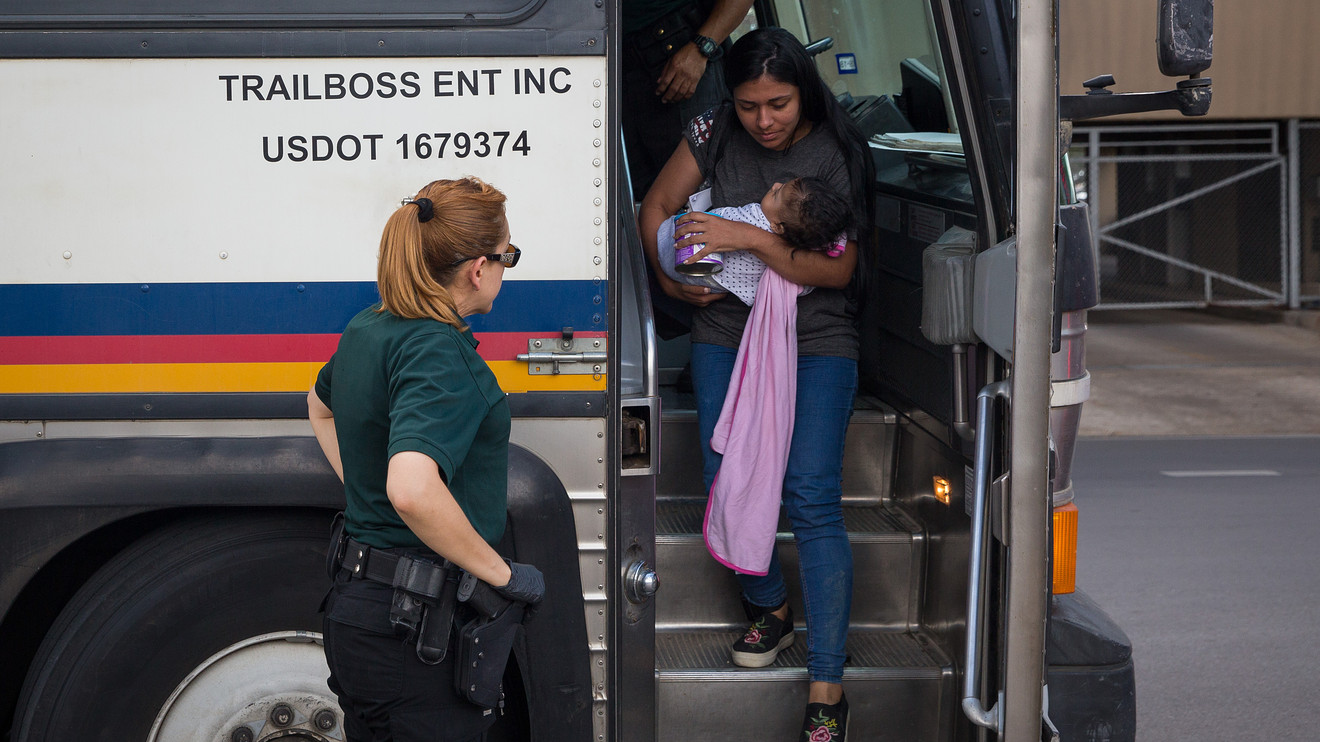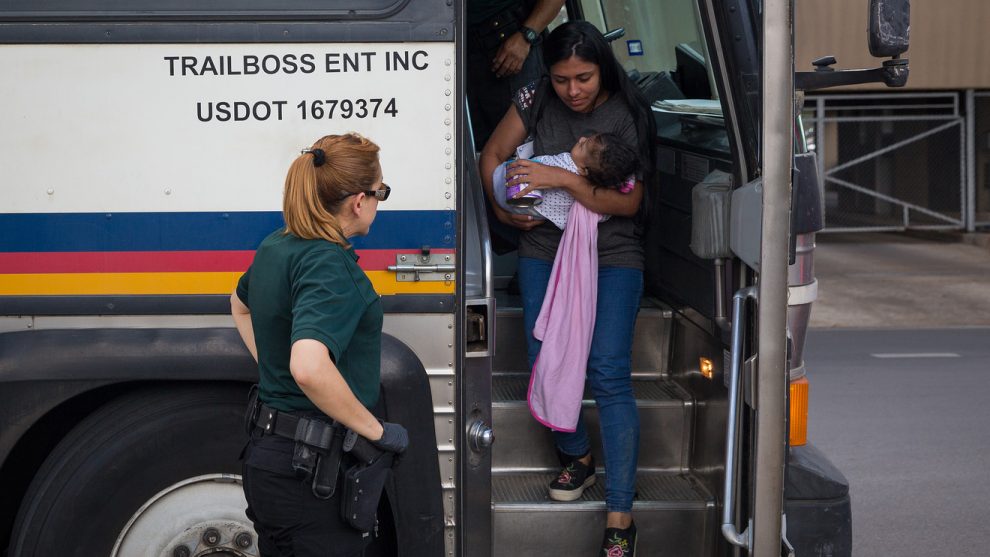
How much does freedom cost? For immigrants detained in the U.S. it can be as low as $1,500 or as high as $80,000.
The public backlash to the Trump administration separating immigrant parents from their children at the border continues, with criticism from advocates and politicians, including the four living former first ladies, who separately condemned it as “cruel” and “immoral.”
Last week, lawyers warned that children are taking care of other children and, according to the Associated Press, there’s inadequate food, water and sanitation for the 250 infants, kids and teens at the Border Patrol station near El Paso, Texas.
‘The challenge of how to humanely house and process undocumented immigrants, particularly unaccompanied children and children separated from their parents, is not new.’
“In my 22 years of doing visits with children in detention I have never heard of this level of inhumanity,” Holly Cooper, who co-directs University of California, Davis’ Immigration Law Clinic and represents detained youth, told the AP.
Representative Alexandria Ocasio-Cortez, a freshman Democrat from New York, last Tuesday sparked a nationwide debate when she compared these detention centers to concentration camps.
“This administration has established concentration camps on the southern border of the United States for immigrants, where they are being brutalized with dehumanizing conditions and dying,” she wrote on Twitter TWTR, +0.43%
Financial support for immigrant families has soared in recent months. One Bay Area couple created a fund-raising page on Facebook FB, +1.85% for Raices, a nonprofit organization providing low-cost legal defense services to immigrant families in Texas, and raised more than $20.7 million after setting a goal to raise just $1,500.
“We do not have the words to thank Charlotte and Dave Willner,” according to the Raices Facebook page. “Thanks is inadequate for the work these funds will make possible. We know it will change lives. We know it will save lives by keeping people from being deported to unsafe countries.”
By law, immigration bail is set at a minimum of $1,500. That’s higher than traditional criminal court bail, which can be as low as $50.
“This is such a profound rejection of the cruel policies of this administration,” it added. “Take heart. There are terrible things happening in the world. And there are many people who are deciding not to look away but to do something. Thank you. Thank you. Thank you.”
“The challenge of how to humanely house and process undocumented immigrants, particularly unaccompanied children and children separated from their parents, is not new,” Michael Rosen, president of Philadelphia-based charity consulting firm ML Innovations, Inc., told MarketWatch. “Many charity options exist for people who want to help undocumented immigrant children.”
He suggested finding charities with a proven track record rather than new organizations, determining what services you want to help provide, researching the charities before donating, and donating by mail, over the phone, or through a secure donation site to ensure security. Sites such as Charity Navigator and Charity Watch help donors vet charities.
Also see: Is your boss a psychopath?
Immigration advocates have noted one sure-fire way to help people separated from their children: Posting their bail. This is one of the fastest ways to reunite immigrants with their family, said Pilar Weiss, project director at the National Bail Fund Network.
Donating to community bond funds can immediately “lead to freedom,” she said. Community bond funds are charities, like Raices, that use funds to post bail and provide legal defense for detained people.
Bail can cost anywhere from $1,500 to $80,500
When undocumented immigrants are detained by U.S. Immigration and Customs Enforcement (ICE) or U.S. Customs and Border Protection (CBP), they are held in detention until they go to trial where the court will decide whether they can stay in the country.
In some cases, the immigration judge will let them go while they await trial if they first pay a bail bond. Bail is set at a legal minimum of $1,500, but can be much higher. The bond is meant as a deposit to ensure the accused will report to their trial. If they attend all of their court appointments, they can get the money back.
But many people have trouble coming up with the funds. The average bail bond issued by the San Francisco immigration courts in 2014 was $3,411 and the average cost of bond in immigration courts nationally is $6,500. Bond amounts could be as high as $80,500 on Central District of California immigration bonds, according to a 2015 study by USC law professor Emily Ryo.
In theory, bonds are set higher for some immigrants because they are deemed more of a “flight risk,” or likely to skip their court date, said Trevor Houser, director of the Immigrant Family Defense Fund, a nonprofit that pays bonds for detained immigrants.
An immigrant new to the U.S. may have a higher bond than one who has lived there for many years with a family and is less likely to leave, he added. However, in practice there are huge discrepancies in bond amounts across the country largely based on what individual judges decide, Houser said.
By law, immigration bail is set at a minimum of $1,500. That’s higher than traditional criminal court bail, which can be as low as $50. A recent comparison of bail amounts in New York City found that it’s 50% more expensive to get out of immigration detention than regular jail.
Immigrants who are unable to make bail can spend days, months, or even years in detention awaiting their court date. There is no federal limit to how long an immigrant can be detained without trial.
Immigrants who are unable to make bail can spend days, months, or even years in detention awaiting their court date. There is no federal limit to how long an immigrant can be detained without trial. In criminal court, the defendant is entitled to a trial between 30 and 60 days of being in custody, according to the law, but the date can be delayed months or even years while they sit in jail without being convicted.
Under the Trump administration, very few immigrants are being offered bail initially, Houser said. Nonprofits that provide free or low-cost legal defense to undocumented immigrants are working to get their clients court dates where defense attorneys can request that bond be set. Those same groups then pay the bond so the defendant can spend the time awaiting trial out of jail with their family.
In one recent case, a client of the Immigrant Family Defense Fund spent the last year and a half in detention after he was denied bond, House said. The immigrant came to the U.S. with his 9-year-old son to flee violence in Guatemala targeting them for their indigenous identities. By the time he is released from jail in the coming weeks, his son will be 10.
Being free on bond also helps immigrants in court
A number of community bond funds have been set up across the country to help those detained by ICE. Paying bail can make a huge difference in the trajectory of a case: Immigrants who are bonded out are eight times more likely to win their cases than unrepresented detainees, according to the Immigrant Family Defense Fund.
“In addition to the reduced financial and mental-health strain on the family, getting released on bond substantially increases the odds of winning relief in your immigration case because you can meet freely and regularly with your attorney and have greater ability to prepare the documentation you need,” Houser said.
Recommended: Classism and elitism are alive and well in Corporate America
The United States has a uniquely expensive bail system compared to other developed countries, according to an analysis from Pricenomics.
The traditional criminal courts’ bail system, which is different but parallel to the immigration detention bond system, has been recently criticized by high-profile advocates. Musician and singer Jay-Z released a documentary in 2017 about Kalief Browder, a New York boy who jailed in 2010 at the age of 16 after being charged with stealing a backpack.
Unable to pay the $3,000 in bail, Browder remained in jail on Rikers Island for three years, including two years in solitary confinement. He maintained his innocence and the charges were dismissed in 2013. But he took his own life in 2015 after his release, a death his parents blame on his treatment in jail.
In California , the state Supreme Court had weighed a proposal that would allow a judge to consider a defendant’s ability to pay when setting bail amounts. That overhaul of California’s cash bail system has now been put on hold, pending a 2020 referendum.
Advocates say the ongoing immigration issue is highlighting the flaws of the cash-bail system in the U.S. “The sheer number of people who are incarcerated in this country has reached crisis levels,” Weiss said. “But with immigrant detention and incarceration due to ICE, there is a new awareness growing around that as well.”
In addition to paying the bail for detained immigrants, some organizations are also able to negotiate the cost of bail down or pay for several bail funds at once. The Eastern Iowa Community Bond Project paid a total of $35,000 to release 20 of the 32 men arrested in a recent raid.
DIRECTORY OF CRIMINAL SYSTEM BAIL FUNDS
National organizations funding bail across the U.S.
Queer Detainee Empowerment Project
Local organizations funding bail for immigrants
Arizona
Tucson Second Chance Bail Fund
Colorado
California
Bay Area Immigration Bond Fund
Immigrant Families Defense Fund
The Orange County Justice Fund
Connecticut
Florida
Hawaii
Illinois
Champaign County Bailout Coalition
Iowa
Eastern Iowa Community Bond Project
Kentucky
Louisville Community Bail Fund
Louisiana
New Orleans Safety & Freedom Fund
YWCA Greater Baton Rouge Community Bail Fund
Massachusetts
Minnesota
Nebraska
Nevada
New York City
New York State
EOC of Suffolk Inc. Charitable Bail Fund
OAR of Tompkins County Bail Fund
North Carolina
Southern Coalition for Social Justice Bail Fund
Alamance County Community Bail Fund
North Carolina Community Bail Fund of Durham
Oregon
Pennsylvania
Philadelphia Community Bail Fund
Tennessee
Hamilton County Community Bail Fund
Texas
Detained Migrant Solidarity Committee Fianza Fund
Community Bail Fund of North Texas
Virginia
Charlottesville Community Resilience Fund
Washington
Wisconsin
DIRECTORY OF IMMIGRATION BOND FUNDS:
National organizations across the U.S.
Freedom for Immigrants National Bond Fund
Haitian Immigrant Bond Assistance Project
Arizona
Pima Monthly Meeting Immigration Bond Fund
California
Bay Area Immigration Bond Fund
Immigrant Families Defense Fund
San Diego Immigrant Rights Consortium — Borderlands Get Free Fund
Colorado
Immigrant Freedom Fund of Colorado
Connecticut
Iowa
Eastern Iowa Community Bond Project
Massachusetts
Beyond Bail & Legal Defense Fund
Michigan
Kent County Immigration Bond for Our Neighbor’s Defense Fund
Minnesota
New Hampshire
NH Conference UCC Immigrant and Refugee Support Group
New York
LIFE Bond Fund (New Sanctuary Coalition)
New York Immigrant Freedom Fund
Ohio (includes Northern Kentucky)
Texas
Hutto Community Deportation Defense & Bond Fund
Vermont
Virginia
Washington
Fair Fight Immigrant Bond Fund
(This story was originally published was updated on June 26, 2019)











Add Comment